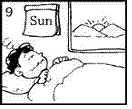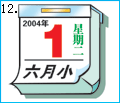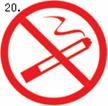网址:http://m.1010jiajiao.com/timu3_id_2406816[举报]
looking at their watches always. It isn't that our friends are all very busy. It is just because we haven't a
TV set. They think that we are very strange.
But what do you do in the evening? They always ask. The answer is very simple. Both my wife and I
have hobbies. We certainly don't spend our evenings staring at the walls. My wife enjoys cooking and
painting and often has evening classes for foreign languages. This is very useful because we often go to
other countries for our holidays. I collect stamps and I am always busy with my collection. Both of us
enjoy listening to music and playing chess together.
Sometimes there is power cut and the house is dark. We are not worried because we can just light
candles and chat with each other about what we did before. Our friends are upset at that time because
they don't know what to do without a TV set. On such evenings, our house is always full because my
friends all come to us. They all have a good time. Instead of sitting in silence in front of the television,
everybody talks and plays games.
B. feel very upset
C. like to talk much
D. are very friendly
B. they are strange people
C. they enjoy spending evenings in their own ways
D. they don't know what to do when there is power cut
B. traveling
C. collecting
D. cooking
B. have to go out for candles
C. will welcome many visitors
D. do nothing and sit without any word
B. electricity is important
C. life is enjoyable without television
D. life is impossible without a television
The boy stood there and tears (眼泪) 4 from his big blue eyes. Feeling sorry, the father said, “You can do it later.”
The boy said nothing but walked away 5 . That evening the father said, “Come and 6 the kisses now, Andrew!” But the boy didn’t.
Unfortunately, a few days after the father’s birthday, the boy had a(n) 7 and died(死). His sad father wrote, “If only I could tell him how sorry I am for words, and how 8 my heart is hurting.”
Love is a two-way street. We must warmly accept(接受) any loving act, or others will regard it 9 a “no” and it can leave a scar(伤痕). If we don’t get love, our life will have no meaning. Nothing is more important than 10 love from those who are near and dear to us.
小题1:A. because B. so C. but
小题2:A. stopped B. forgot C. started
小题3:A. busy B. angry C. hungry
小题4:A. felt B. fell C. flew
小题5:A. excitedly B. friendly C. quietly
小题6:A. finish B. get C. take
小题7:A. matter B. accident C. event
小题8:A. many B. much C. long
小题9:A. as B. with C. for
小题10:A. giving B. asking C. accepting
| |||||||||||||||||||||||||||||||||||||||||||||||||||||||||||||||||||||||||
听力测试
(一)听句子,选择与画面一致的选项。每个句子听一遍。




1. ( A B C ) 2. ( A B C ) 3. ( A B C ) 4. ( A B C )
(二)请听句子,选出恰当的答语。每个句子听一遍。
( )5. A. It’s my pleasure. B. I’m sorry to hear that. C. Never mind.
( )6. A. I’m not sure. B. Yes, please. C. That’s too much.
( )7. A. Nice to meet you. B. See you later. C. What a good idea!
( )8. A. Yes, I agree with you. B. Certainly, This way, please
C. Yes, it’s very nice of you.
( )9. A. What are you going to do?
B. I think so. Why?
C. Oh, what shall I do?
( )10. A. It’s cheaper than yours. B. Fifty yuan. C. It’s expensive.
(三)对话问答:选择正确答案对话听两遍。
( )11. Who is going to visit her friends this afternoon?
A. Betty. B. Betty’s sister. C. Bob’s sister.
( )12. Why did the girl get up so early?
A.To catch the early bus.
B. To prepare for an English exam.
C. To prepare for a math’s exam.
( )13. Where was the man last Sunday?
A. He was with his friend.
B. He took a walk with his friend.
C. He went shopping with his friend.
( )14. Where does the dialogue take place?
A. In a classroom. B. In a store. C. In a computer room.
( )15. What’s the woman?
A. A shop assistant. B. A librarian. C. A customer.
( )16. When does the dialogue probably happen?
A. In the morning. B. In the evening C. At 7:45 a.m.
( )17. What place is the woman looking for?
A. A hotel. B. A cinema. C. A hospital.
(四)对话理解:
听第一段对话,回答第18-21小题。对话听两遍。
( )18. What are they talking about?
A. The moon. B. Animals. C. Plants.
( )19. How far is the moon away from the earth?
A. Three hundred metres.
B. Three hundred and eighty thousand kilometres.
C. It’s not very far
( )20. Why can nothing live on the moon?
A. People don’t like to live there. B. There’ no air or water.
C. There’s no light.
( )21. What’s the weather like tonight?
A. Cloudy. B. Rainy. C. Clear.
听第二段对话,回答第22-25小题。对话听两遍。
( )22. Where are they talking?
A. At home. B. At the cinema. C. At a shop.
( )23. How much rice did the man buy?
A. One bag. B. Two bags. C. One bottle.
( )24. How many kinds of things did the man buy?
A. Four. B. Five. C. Three .
( )25. How much did all the things cost?
A. $13. B. £300. C. $30.
(五)听短文回答问题,短文听两遍。
( )26. Where was the telephone?
A. It’s in London’s school. B. It’s in her office. C. It’s in her home.
( )27. Who made the first telephone call?
A. A man. B. Linda’s father. C. Linda’s mother.
( )28. How many telephone calls did the man make in the story?
A. One. B. Two. C. Four
( )29. Who made telephone call three minutes later?
A. The man. B. Linda’s father. C. Linda’s mother.
( )30. How many persons are there in the story?
A. Two. B. Three. C. Four.
During my childhood in the 1960s, my parents were always busy with work and meetings. They left early in the morning and came back late in the evening. My sisters, my brother and I were left alone with Grandma. We saw our parents only on Sundays and during the few holidays. The only long period (一段)of time during which the whole family could be together once a year was the Spring Festival. We missed our parents badly, but didn’t say so because we had been told that hard work was everyone’s duty and that we could not have our own small family without a big family. Later I was a hard working student and, during summer or winter holidays, often stayed alone at university to have more time to study. I was always encouraged by my parents, for whom the holiday was less important than “work” and “study”. Holidays were a waste of time and I felt as if I had done something wrong if I took a holiday or did nothing during a holiday.
I spent the most difficult period of my life abroad. But when I joined this company, my boss didn’t seem to think it right for me to work like that. When I called him at home after office hours for business purposes (目的), he politely told me that he preferred talking about work with me in the office.
When the holiday season came near, he asked me to plan my leave beforehand (提前). He talked with me about his holiday and also asked about mine. For him, leave was a right. Giving up a holiday for the company is encouraged in China, but is foolish here. I began to think about holidays.
Today my parents are retired (退休)and stay home with a lot of time for their children. But we are all grown- up and live far away. We miss each other, but we cannot afford to see each other very much and they often feel sorry for the fact that they were too busy to be able to take care of us when we were young.
Nowadays, Chinese take long weekends and have paid holidays. But do they use their holidays to enjoy family life? I hope so because my experience in China and Europe has helped me understand that work is not my whole life and that a family is also very important. I do not want to feel sorry in the future as my parents do and I certainly spend as much time with my son as possible. There is nothing wrong with either working hard or taking holidays, but we shouldn’t have one instead of the other. It is important to keep a balance (平衡)between work and play.
1. What do the underlined words “paid leave” mean?
A. You have to pay when you take a holiday.
B. Someone will pay for your holiday.
C. You are still paid when you have your holiday.
D. You can’t leave until you pay for the holiday.
2. What is the main idea of this passage?
A. Working is the only part of the life.
B. Traveling is the best way to spend your holiday.
C. Enjoying holidays is as important as working
D. Sharing happiness with your family is more important
3. The writer talks about her own experience because she hopes that the Chinese will _______. A. plan their holiday beforehand B. get used to long holidays and enjoy themselves C. give up a holiday for their work D. bring business home after work hours
查看习题详情和答案>>